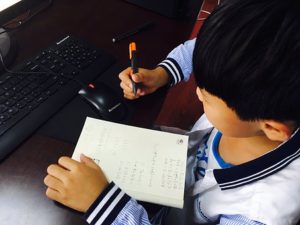Is your child easily distracted? Does he have boundless energy? Does he have problems paying attention in the classroom? If you answered yes to all of these questions, you might be wondering if your child has ADHD. Given that approximately 11% of children in the United States will be diagnosed with ADHD at some point in their childhood, it is a very common phenomenon. However, just because your child is displaying some of the symptoms, this does not mean that he has ADHD. Even if he does have ADHD, it may not be having a significant impact on his functioning at home and school, his self-esteem, or his capacity to get along with others.
Most parents who have a child showing some of the signs of ADHD notice it themselves when the child can’t sit for dinner goes from one activity to another, reports that he is always feeling bored, or has problems following directions. While these may be minor inconveniences at home, they may have more of an impact in school. Teachers frequently inform parents of their concern that their child can’t sit through class activities or struggle to keep up with schoolwork. Difficulties such as this are not necessarily a sign of ADHD and could be a result of learning difficulties, slow processing speed, anxiety, self-esteem concerns, or family stresses. There are also developmental features for some children, who may just be somewhat slower to develop self-control or memory skills that will help them to perform better in school. This is where a neuropsychological evaluation is highly beneficial.
 As a child neuropsychologist, I see the value of conducting neuropsychological evaluations for further understanding a child’s development, intellectual and self-control capacities. The neuropsychological evaluations conducted by Randy Kulman. Ph.D. and our team at South County Child and Family Consultants also focus on assessing executive-functioning skills. For many kids with ADHD, the critical symptoms are difficulty with organization, time management, persistence, and working memory – in other words, executive functions – rather than hyperactivity and loss of focus. However, not all kids who struggle with executive-functioning skills need a psychological evaluation. A neuropsychological evaluation is a time-consuming, comprehensive perspective on a child’s cognitive, neuropsychological, and executive functioning capacities. Many neuropsychological evaluations also include educational evaluations, as well, to rule out learning disabilities.
As a child neuropsychologist, I see the value of conducting neuropsychological evaluations for further understanding a child’s development, intellectual and self-control capacities. The neuropsychological evaluations conducted by Randy Kulman. Ph.D. and our team at South County Child and Family Consultants also focus on assessing executive-functioning skills. For many kids with ADHD, the critical symptoms are difficulty with organization, time management, persistence, and working memory – in other words, executive functions – rather than hyperactivity and loss of focus. However, not all kids who struggle with executive-functioning skills need a psychological evaluation. A neuropsychological evaluation is a time-consuming, comprehensive perspective on a child’s cognitive, neuropsychological, and executive functioning capacities. Many neuropsychological evaluations also include educational evaluations, as well, to rule out learning disabilities.
Neuropsychologists don’t just meet with a child and family for 30 minutes and pronounce that the child has ADHD. Neuropsychological evaluations are data-driven. Rather than saying that a child is “just being a boy,” we see how other same-age boys perform on a variety of different tests, measures, and observations and compare that child to the norm. In a similar fashion to your child’s pediatrician informing you that your child is the 60 percentile for height and the 50 percentile for weight, neuropsychologists can make the same types of statements about a variety of psychological and behavioral constructs.
While it might be nice to know these things about your child, a neuropsychological evaluation is a commitment of your time, effort, and, depending on your insurance plan, sometimes your money. The first question I suggest that parents ask is are the concerning behaviors causing a degree of impairment for their child at school, at home, or in social situations. If so, a neuropsychological evaluation can provide very valuable insights that can lead to a set of clear strategies and recommendations to help children do better in these settings.
I encourage parents of potential patients to read through some of the articles and pages on our South County Child and Family Consultants website. Learn more about specific tests that are administered and what is included in a test report. If you have other questions, please give us a call at 401-789-1553 or find a child neuropsychologist in your area.
Receive online class information and helpful tips from Dr. Randy Kulman's LearningWorks for Kids |




